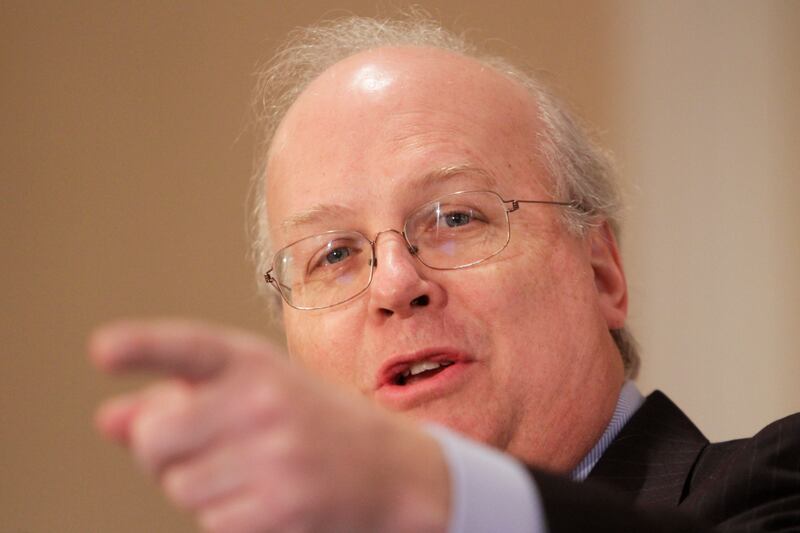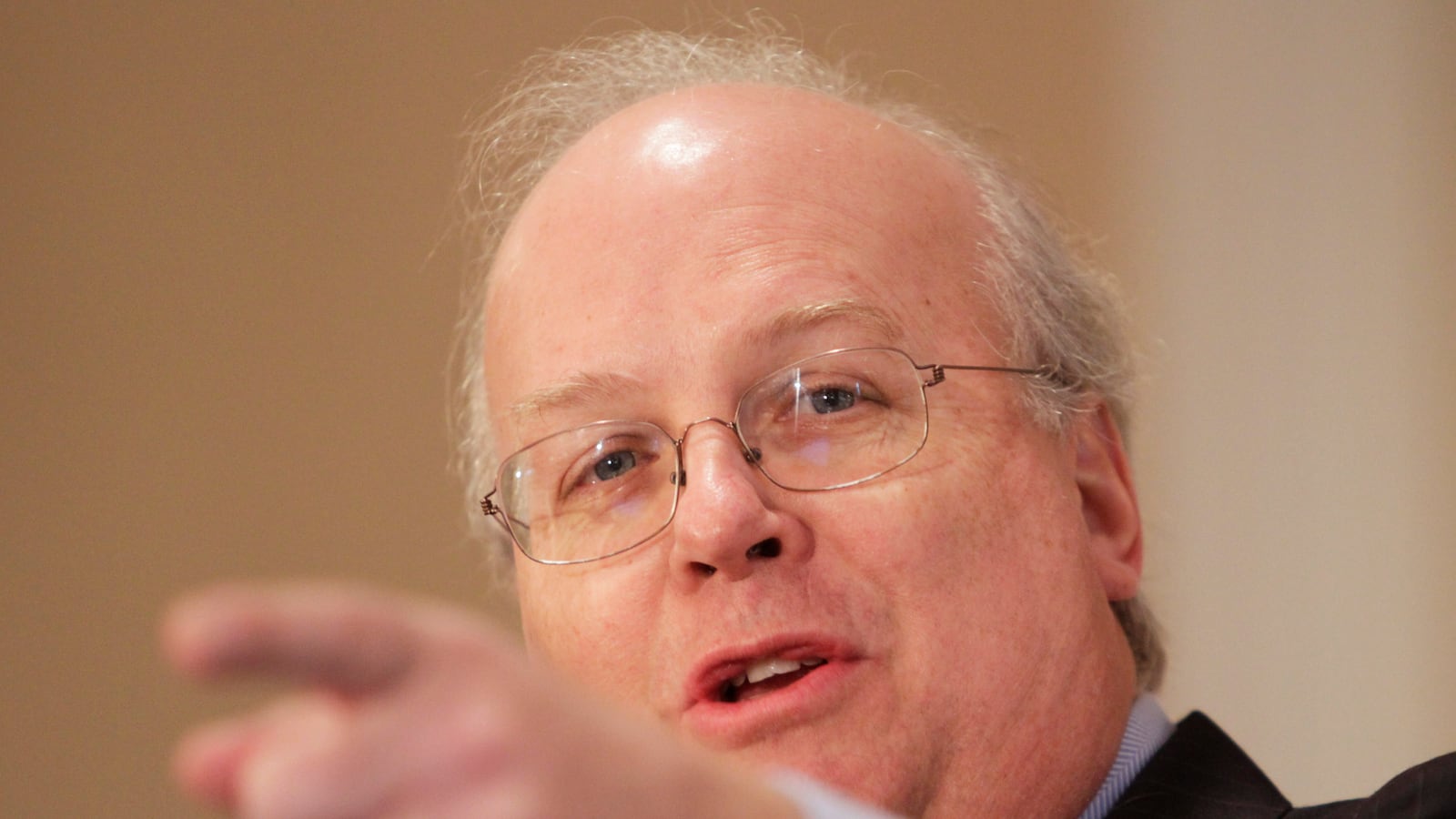Since 2010 the Republican Party has lost five Senate races that it believes it should have won.

In his latest attempt to save the party from itself, Republican strategist and pundit Karl Rove last week announced the formation of the Conservative Victory Project, a super PAC intended to fuel and direct the nomination of electable Republican Senate candidates. Not surprisingly, Rove has met with denunciation by the Tea Party, and this intraparty conflict stems from what the Republican Party is and who Rove is not. One thing is certain: he is not Chuck Schumer, and that is a problem for both Rove and his party.
Rove, who helped guide George W. Bush to capture the Texas governorship and then the White House, continues to play an outsized role within the party, even as his former boss has left the stage. The past year, Rove’s super PAC, American Crossroads, raised and spent millions of dollars but came up short on Election Day at the same time that Rove was making the Republicans' case as a Wall Street Journal columnist and a Fox News pundit. It is a complicated fusion of roles (perhaps made necessary by his lack of official standing within the GOP) that is further complicated by the challenge of working on behalf of a party that channels the values of white Americans at prayer in an ever more secular and diverse nation.
It can be fairly said that Tea Party legislators are shaped by conviction and circumstance, much like those of representatives of Manhattan’s Upper West Side or Chicago’s South Side. But when and if such figures decide to run statewide, they must pivot toward the center, park some of the bombast at the door, and convey that they are ready to be the senator of an entire state.
Instead, Republican congressmen looking to move to the upper chamber too often treat their Senate runs simply as elections to a larger district with better perks. The tenor of their campaigns matches the tone that marked their local races, only with a bigger and louder megaphone. The notable Republican failures seemed less focused on coalition building and more driven by rallying the faithful. And—see Todd “legitimate rape” Akin—the ideological consistency that is prized in home districts proves damaging in a statewide race.
Now 2014 is around the corner, and Republicans hope to collect the big gains that often accrue to the party outside of the White House in the president’s sixth year. Recent polls show Iowa Congressman Steve King as the leading Republican for the seat being vacated by five-term Sen. Tom Harkin. King has compared immigrants to animals, saying that the immigration process should be akin to selecting a “good bird dog” from a “litter.”
In Georgia, Republican Congressman Paul Broun has declared his intention to fill the seat vacated by Saxby Chambliss. A member of the House Science, Space and Technology Committee (Akin was also a member), Broun has nonetheless observed that “evolution, embryology, and the Big Bang theory—all of that is lies straight from the pit of hell.”
Enter Rove.
With the Republicans’ Senate losses last year, what could be described as the Republicans’ K Street wing said “enough.” The GOP denizens of Gucci Gulch look to tilt the nominating process away from the grassroots and toward candidates with potentially greater bipartisan appeal.
That strategy clashes with a Republican base that is particularly Jacksonian in off-year elections, like the 2010 Tea Party wave. It also glosses over the fact that missed-Senate opportunities are the flipside of the same coin that powered the GOP’s takeover of the House that year. At its core, the Republican Party is a bottom-up, anti-authoritarian working- and middle-class party.
Conservative activists have wasted no time in trashing the Conservative Victory Fund. Movement stalwarts like Brent Bozell have all but called Rove’s gamble treacherous. Breitbart.com is now going hammer and tong at Rove. Erick Erickson lambasted Rove for his super PAC’s recent failures and then let loose with a litany of conservative grievances: “The people who brought us No Child Left Behind, Medicare Part D, TARP ... Harriet Miers, etc., etc., etc., are really hacked off that people have been rejecting them.”
In their eyes, Rove is more Wizard of Oz than Architect, more profiteer than player. They might add that he is no Chuck Schumer.
These days Schumer is ranked third among Democrats and serves as vice chair of the conference and chair of the Senate Democratic Policy and Communications Center. Like Rove, Schumer controls a spigot of cash that can help launch a candidacy or make the difference between winning and losing, and is a master of the intersection and fusion of politics and policy.
But there are significant differences between the two. Rove is not a sitting senator, and in fact has never run for or held elected federal office. He is more a creature of his patrons, and lacks a party-sanctioned mechanism for imposing his will. Rove may be defied.
In contrast, Schumer is able to pick who runs for Senate. Case in point, Jim Webb’s 2006 run for U.S. senator from Virginia. Webb, a former Navy secretary under Ronald Reagan, a graduate of Annapolis, and a Vietnam veteran, was pitted in the Democratic primary against Harris Miller, a longtime Democratic activist. Webb had entered the primary at the urging of Schumer, who then headed the Democratic Senatorial Campaign Committee.
Mindful that Webb would be the stronger candidate in the fall, Schumer told Miller to quit attacking Webb and instead to turn his guns on the incumbent, George Allen. Miller obeyed. Virginia elected Webb.
Not surprisingly, the Democrats are satisfied with this top-down, but winning, approach. The difference between Senate Democrats and Republicans these days is that the Democrats have an effective kingmaker, while the Republicans are stumbling in the dark fighting over who even gets to brush up against the keys to the kingdom.





